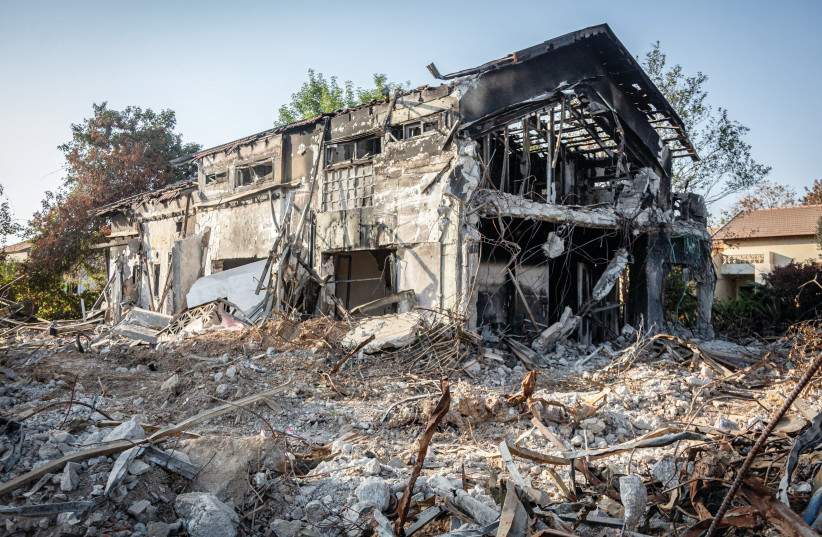It’s a flood. Having generated more than 80 Hebrew books by June, the October 7 massacre by Hamas is expected to yield by the end of the year hundreds of published eulogies, analyses, and personal accounts, all of which will be but a prelude to the future’s piles of academic works.
Reflecting an informational thirst and a therapeutic need following the worst trauma in Israeli history, the books are typically journalistic reconstructions of the day’s events, like Ilan Kfir’s Gaza Division Conquered (Yediot, 2024) or tales of personal experiences, like Yair Agmon and Uriah Mevorach’s anthology One Day in October (Magid, 2024).
One title, however, represents an entirely different category, an expository essay which, rather than tell October 7’s dreadful events, probes their meaning, and does so in what is the most original, insightful, and instructive Israeli statement about the war so far.
WRITTEN BY philosopher and public intellectual Micah Goodman, The Eighth Day: Israel After October 7th (Hakipod Vehashual, 2024) argues that by having fought as patriotically as Israel’s soldiers have, and volunteered as selflessly as its citizenry did, Israeli society proved that its ostensibly deep disputes are actually shallow, fanned by politicians who pull us to the extremes.
Decrying identity’s defeat of argument and calling for “a politics of broad agreements,” Goodman notes that on October 7 Israelis were thrust for one day into Exile, the pre-Zionist Jewish mindset of vulnerability and helplessness. The result was a sudden reckoning that the prewar bickering over constitutional reform reflected mainstream Israel’s infection by “the polarization virus.”

The post-October 7 mourning and fighting may kill this virus, as Israelis hopefully return to listen to each other respectfully, and to seek what they can do together and by agreement, rather than separately and by imposition.
Goodman, whose first bestsellers were about Judaic and Israeli themes, from the works of Maimonides, Moses, and Yehuda Halevi to the debate over Greater Israel and the crisis of Israeli secularism, later shifted to the universal subject of social media’s threats to humanity, as this column noted at the time (“Hanukkah and the new idolatry,” November 25, 2021).
The Eighth Day was originally about the global crisis of political polarization, a universal discourse that was supposed to end with a chapter depicting Israel as a paradigm of the desired balance between Western civilization’s ideals of individualism, and other civilizations’ collectivist alternatives.
The war shelved that manuscript, making way for the author’s urgent statement to his fellow citizens. This doesn’t mean that the war we are fighting is an exclusively Israeli problem. In the ideational sense, it’s part of a world war.
This war is a world war because of its motivation, tools, and aims.
In terms of motivation, Israel is attacked for espousing the three pillars of Western civilization as Goodman counts them: individualism, liberalism, and capitalism.
These inclinations create a mental tension. On the one hand, Western individualism and capitalism feed Israel’s technological superiority. On the other hand, Western liberalism constrains Israeli fighting because it seeks to minimize Israeli casualties.
That is why this war is a clash between the West and its rivals also in terms of this collision’s tools: The West detests the idea of weaponizing people. Its rivals do not.
Hamas, Hezbollah, and Iran’s mullahs openly hail martyrdom as preferable to life. Their indifference to the number of Muslim deaths that an Islamist attack on a Western outpost would cost starkly contrasts the celebration of life, ambition, and self-fulfillment in Western education, literature, and film.
Russia also shows little concern for the number of Russian casualties its war on Ukraine entails. Fighting its co-religionists, and thus not religiously motivated, Moscow’s thinking is also what Goodman calls “collectivist,” meaning it sees the individual as merely a servant of the multitude.
The same goes for China, which recently hosted a Hamas delegation, part of a stated quest to reconcile Palestinian rivals, in utter disregard of Hamas’s murderous record and jihadist beliefs.
Hovering above these is the war’s overall aim. Just like they scorn the Western celebration of life and individualism, Russia, China, and Islamist fundamentalism all detest, and fear, the Western ideal of political freedom. This is what these strange bedfellows are all out to defeat.
Nothing epitomized this conviction more starkly than the way Gaza was run by Hamas during the 17 years in which it fought freedom of speech, association, women, and gays, while teaching bigotry, neglecting life, engineering war, and preaching death.
War not meant to end in Jerusalem
The war, as Islamist leaders repeatedly made plain, is not meant to end in Jerusalem. It is meant to proceed to the rest of the world.
Even so, like Europe in the 1930s, Western leaders and opinion makers still think that the enemy staring at them wants nothing but the Jews; that all the wrath, triumphalism, and bellicosity brewed between Gaza, Sana’a, Beirut, and Tehran will end with several diplomatic clauses scribbled somewhere between Paris and New York.
Inspiring French and British arms embargoes on Israel, and American resistance to drastic action in Iran, this escape from confrontation is fed by the same denialism that guided Neville Chamberlain in Munich.
Yes, in the past this column also opposed such confrontation (“Don’t bomb Iran,” November 4, 2011). That was before Iran inspired the October 7 massacre; engineered Lebanese, Iraqi, and Yemeni attacks on Israel’s cities; and unleashed its own missiles on the Jewish state, all the while backed by the anti-Western powers.
This cannot go on, and it won’t. Sooner or later, one way or another, with or without the rest of the West, the anti-Western war on Israel will reach Tehran, much the way what was unleashed with the Nuremberg Laws ended up buried under the rubble of Berlin.
www.MiddleIsrael.net
The writer, a Hartman Institute fellow, is author of the bestselling Mitzad Ha’ivelet Ha’yehudi (The Jewish March of Folly, Yediot Sefarim, 2019), a revisionist history of the Jewish people’s political leadership.
